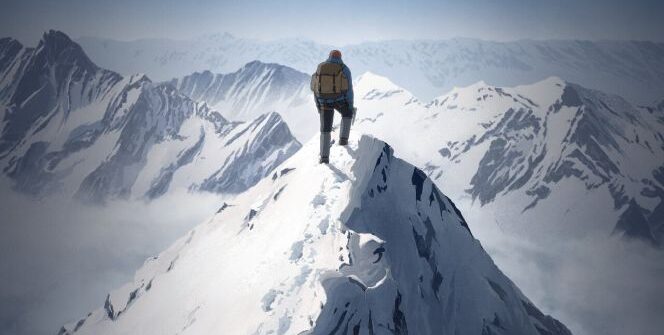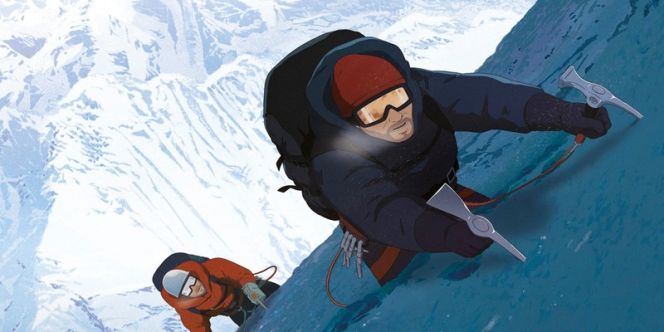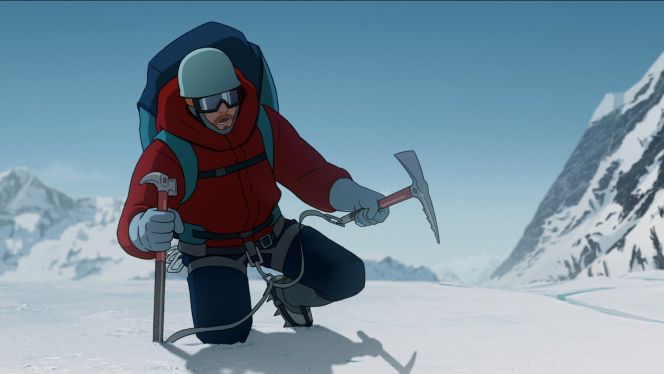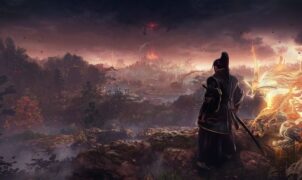MOVIE REVIEW – During the peak of the gods, we may repeatedly wonder, “Why?”. Why are these climbers forced to take on increasingly dangerous challenges to reach heights at altitudes where their bodies are not designed to survive? This animated movie, based on a Japanese manga, does not attempt to answer this question. Still, it tries to give some insight into the minds of passionate people about this activity.
The answer is just one of the things that Japanese photojournalist Makoto Fukamachi (voiced by Damien Boisseau) seems to be chasing in this animated film directed by Patrick Imbert, which came out today on Netflix. Written by Imbert, Magali Pouzol and Jean-Charles Ostorero, “The Gods’ Peak” – based on the manga by Jirô Taniguchi and Baku Yumemakura – follows Fukamachi as he tracks down outcast climber Joji Habu (Eric Herson-Macarel), who he believes is holding key evidence that could answer one of Mount Everest’s greatest mysteries.
Captain Ahab’s fanaticism – in a different way
The characters are fictional, but there is truth in their story. Although the first officially documented summit of Mount Everest was reached by Tenzing Norgay and Edmund Hillary in 1953, the success of George Mallory and Andrew Irvine’s 1924 attempt remains a matter of debate, as the pair never returned. Fukamachi believes that Habu, who has been missing from the climb for years, is in possession of the camera Mallory took with him during the expedition, which may contain images that could finally reveal what happened.
This basic setup allows the gorgeously animated “Peak of the Gods” to approach Habu’s passion for mountaineering in a more accessible way. Habu is a lonely but highly determined climber, and this drive isolates him and forces him to face adversity and tragedy. Such devotion to a deadly sport makes one anti-social – a bit like Captain Ahab’s whaling in Moby Dick.
An amazing sight
The film’s dazzlingly painted mountains are particularly eye-catching, and the climbing scenes are among the film’s highlights. The live-action scenes are nothing compared to how they convey the majesty of the peaks and the technical skills (and physical sacrifices) required to climb them. The quiet, sublime moments that the film captures over some aspects of the imposing Everest also show why these climbers are drawn to mountaineering without downplaying the danger.
Past and present
The Summit of the Gods initially jumps between two timelines: Fukamachi’s present in the 1990s, researching Habu’s history and possible whereabouts, and the mysterious climber’s past. Fukamachi’s obsession with uncovering the truth of Habu and Mallory’s stories mirrors Habu’s obsession with pursuing increasingly challenging climbs.
Through this parallel, it becomes clear that The Summit of the Gods is not necessarily concerned with explaining or justifying a passion. Because sometimes it is less critical why we are attracted to certain things than what we do about them – and that is also the message of this great animated film.
-BadSector-
The Summit of the Gods
Direction - 9.2
Voice actors - 8.8
Story - 9.2
Visuals - 9.4
Ambience - 9.2
9.2
AWESOME
The Summit of the Gods initially jumps between two timelines: Fukamachi's present in the 1990s, researching Habu's history and possible whereabouts, and the mysterious climber's past. Fukamachi's obsession with uncovering the truth of Habu and Mallory's stories mirrors Habu's obsession with pursuing increasingly challenging climbs. Through this parallel, it becomes clear that The Summit of the Gods is not necessarily concerned with explaining or justifying a passion. Because sometimes it is less critical why we are attracted to certain things than what we do about them - and that is also the message of this great animated film.


















Leave a Reply